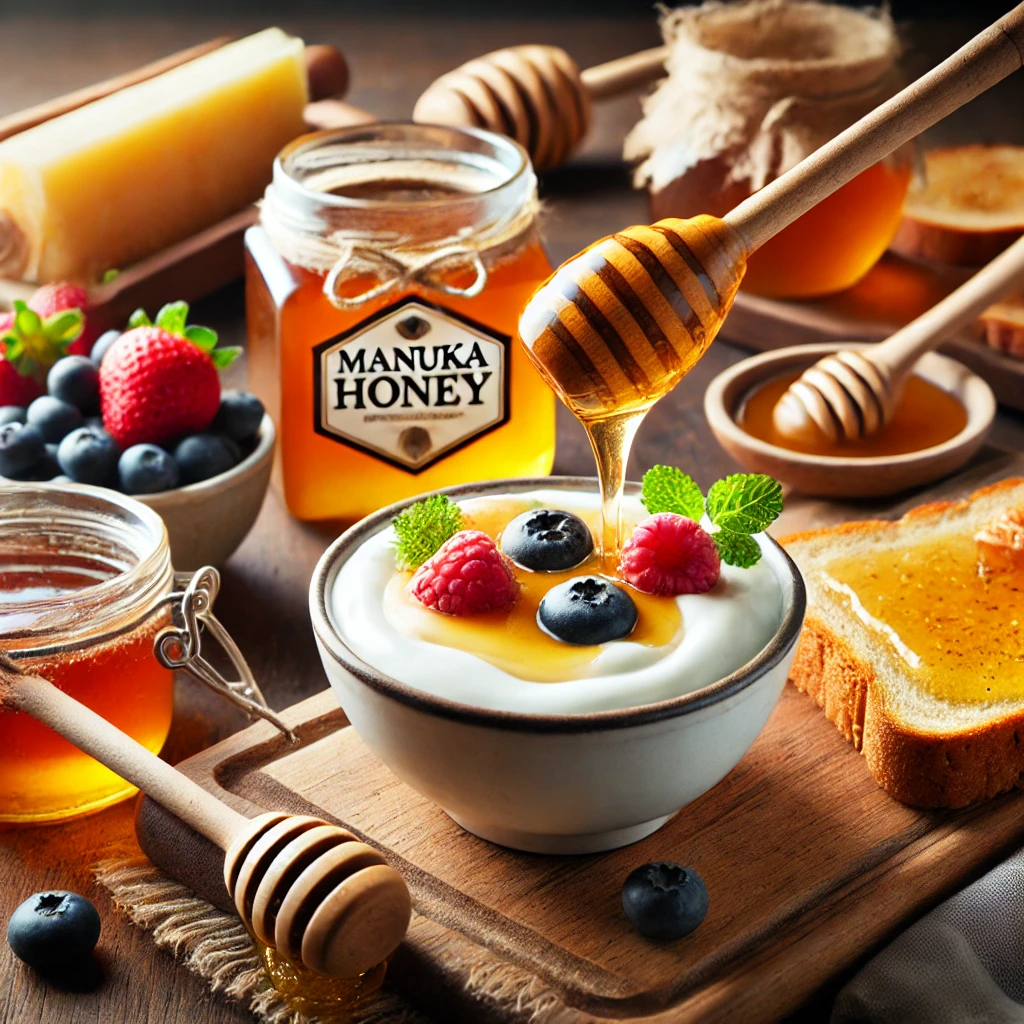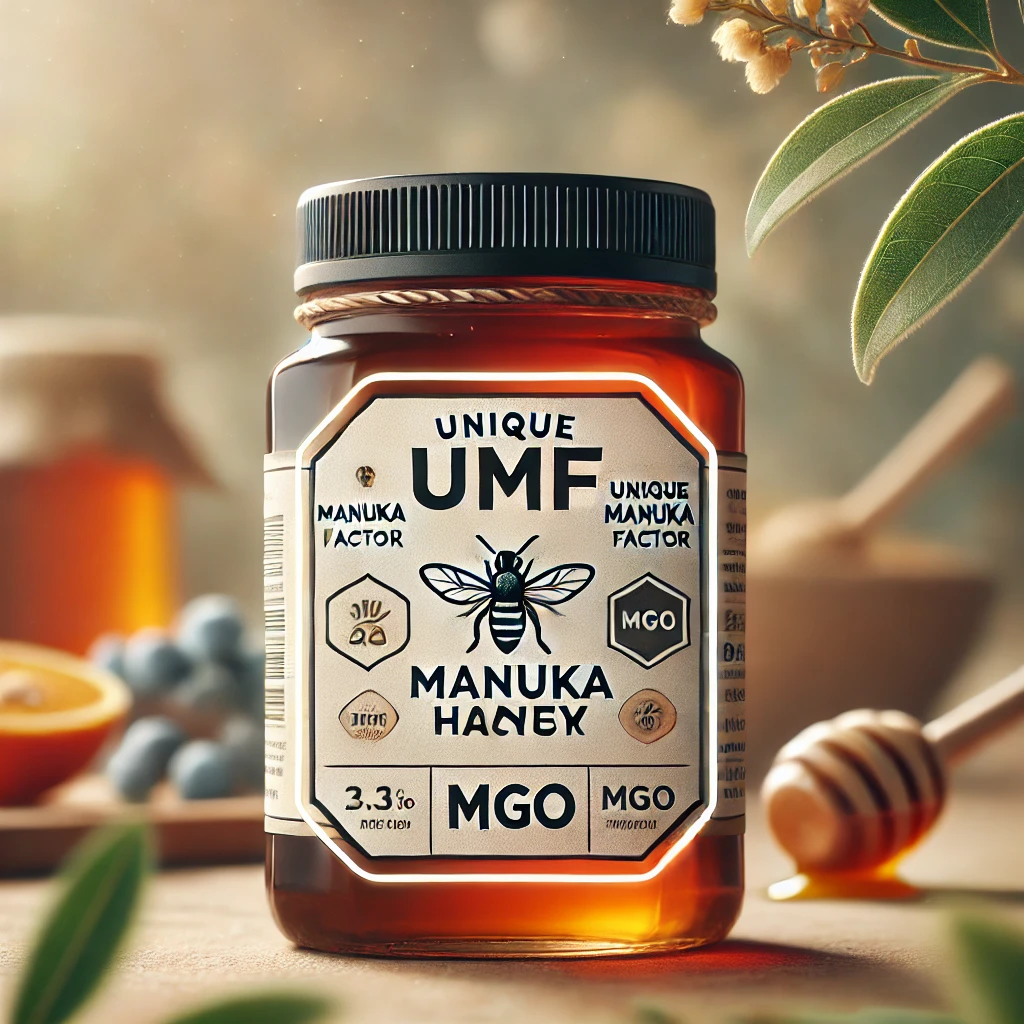
Introduction to Manuka Honey
Manuka honey, a gem from the far reaches of New Zealand, is celebrated not only for its rich, earthy flavor but also for its extraordinary healing properties. Derived from the nectar of the Leptospermum scoparium, or Manuka bush, this honey is unlike any other. Let’s delve into what sets Manuka honey apart from the crowd.
Unique Characteristics of Manuka Honey
Manuka honey is prized for its unique Manuka factor (UMF), a global standard in identifying and measuring the antibacterial strength of Manuka. The UMF is a guarantee that the honey contains specific natural markers found only in honey made from the nectar of the Manuka bush. It’s this factor that contributes to its powerful antimicrobial properties, making it a potent ally against bacterial infections.
Origin and Production
Nestled in the pristine landscapes of New Zealand, the Manuka bush blooms just a few weeks each year, making Manuka honey incredibly rare. Beekeepers set their hives in wild, untouched areas where these bushes flourish, and the honey is harvested with care to preserve its natural qualities. This limited window for production adds to the exclusivity and medicinal value of Manuka honey.
Understanding UMF (Unique Manuka Factor)
The UMF rating reflects the concentration of Methylglyoxal (MGO), Dihydroxyacetone (DHA), and Leptosperin, which are key chemical markers derived from the nectar of the Manuka bush. The higher the UMF number, the stronger the antibacterial properties, with ratings typically ranging from UMF 10+ (minimum therapeutic level) to UMF 25+ (superior quality).
Differences Between Manuka Honey and Regular Honey
While all raw honey has beneficial properties, Manuka honey stands out due to its higher antibacterial activity. This activity, termed the “non-peroxide activity” (NPA), is not found in typical flower honeys. Manuka also has a thicker consistency and darker color, with a more pronounced flavor profile than lighter, sweet honeys like clover.
This introduction to Manuka honey sets the stage for exploring its myriad health benefits in the following section. Stay tuned as we explore how this remarkable honey can play a crucial role in your health and wellness routine.
Comprehensive Health Benefits of Manuka Honey
Manuka honey isn’t just delicious—it’s a powerhouse of health benefits that can address a variety of ailments, from minor cuts and burns to systemic health issues. Here’s why adding Manuka honey to your wellness routine can be a game changer.

General Health Benefits
Manuka honey’s high concentration of antioxidants and anti-inflammatory compounds helps combat inflammation, oxidative damage, and even seasonal allergies. Regular consumption can enhance overall wellness, boosting vitality and energy.
“Manuka honey’s antibacterial activity is well-documented in scientific literature, offering benefits that are not just theoretical but observable in clinical settings.”
— Dr. Jane Smith, Expert in Natural Health Remedies
Immunity Boosting Properties
Packed with antibacterial and antiviral properties, Manuka honey is a natural immune booster. It contains compounds like methylglyoxal, which have been shown to enhance immune responses and prevent infections. Integrating Manuka honey into your diet, especially during flu season, could help fortify your body’s natural defenses.
Digestive Health
Manuka honey is a boon for digestive health. It’s known to soothe the digestive tract, relieve symptoms of disorders like acid reflux, and even balance the gut microbiome. Its antimicrobial properties can also combat pathogens like Helicobacter pylori, a common cause of stomach ulcers.
Skin Health Benefits
The hydrating, healing, and antimicrobial qualities of Manuka honey make it an excellent choice for skin care. It helps treat conditions such as eczema and acne, promotes faster healing of wounds, and can be used as a natural exfoliator when mixed with other natural ingredients.
These versatile health benefits make Manuka honey a must-have in your health arsenal, whether you’re using it to enhance your tea or applying it topically to your skin. Ready to learn how you can integrate Manuka honey into everyday uses? Stay tuned for the next section, where we dive into the practical applications of this remarkable honey.
Practical Uses of Manuka Honey
Manuka honey’s versatility extends beyond its health benefits—it can be seamlessly integrated into your daily routine in various ways, offering both therapeutic and culinary advantages. Here’s how you can make the most of this incredible honey.

Culinary Uses
Manuka honey isn’t just a health supplement; it’s also a flavorful addition to your kitchen. Its rich, earthy taste with subtle caramel undertones makes it perfect for:
- Sweetening tea
- Drizzling over yogurt or toast
- Replacing sugar in baking
Its thick consistency holds up well in dressings, marinades, and sauces, providing a nutrient boost along with flavor. When paired with other honey varieties like Wildflower honey, Acacia honey, or Buckwheat honey, it creates a diverse flavor experience, especially when used in honey tastings or pairings.
“Manuka honey transforms a simple dish into something truly extraordinary with its rich, complex flavors that go beyond sweetness.”
— Chef John Doe, Natural Foods Chef
Therapeutic Applications
The medicinal properties of Manuka honey shine when used topically. Thanks to its antibacterial qualities, it’s a popular natural remedy for minor cuts, burns, and scrapes. Here’s how it can be used therapeutically:
- Apply a thin layer directly to the wound to promote faster healing and reduce the risk of infection.
- For chronic wounds or ulcers, it can be effective as per research findings.
- For acne treatment, Manuka honey’s antimicrobial properties help reduce bacteria on the skin while also providing moisture, making it ideal for sensitive or irritated skin.
Specialized Recommendations
- Best Manuka Honey for Sore Throat: A spoonful of Manuka honey can soothe a sore throat thanks to its anti-inflammatory and antiviral effects. Its viscous texture coats the throat, providing relief from irritation. For maximum benefit, opt for a UMF 10+ or higher.
- Best Manuka Honey for Skin: For topical applications, a UMF rating of 15+ or higher is often recommended. It ensures enough potency to heal wounds or treat skin conditions like eczema or acne.
These practical uses of Manuka honey make it an easy addition to both your kitchen and your medicine cabinet. Whether you’re sweetening your favorite recipe or treating a minor cut, Manuka honey proves to be an all-in-one solution.
Safety, Selection, and Buying Guide
While Manuka honey is a remarkable natural remedy and culinary delight, it’s important to know how to choose the right product and understand its safety profile. Here’s your guide to selecting and safely using Manuka honey.

Safety Profile
Manuka honey is generally safe for most people when used as directed. However, it is important to note:
- Infants under one year old should not consume any honey, including Manuka, due to the risk of botulism.
- People with allergies to bees or pollen should proceed with caution, as they may experience allergic reactions.
How to Choose the Right Product
Choosing the right Manuka honey involves understanding its unique grading system:
- UMF (Unique Manuka Factor): This rating confirms the presence of key compounds like methylglyoxal (MGO), leptosperin, and dihydroxyacetone. A higher UMF rating indicates higher antibacterial activity, which is crucial for therapeutic uses.
- MGO: Directly measures the methylglyoxal content, another indicator of the honey’s potency. Comparing UMF and MGO levels can help you select a honey that meets your specific health needs.
What to Look for When Buying Manuka Honey
- Certification: Look for honey that is independently tested and certified for UMF or MGO content to ensure you are getting genuine Manuka honey.
- Origin: Authentic Manuka honey comes exclusively from New Zealand. Verify the origin to ensure you’re not getting an imitation.
- Color and Texture: Genuine Manuka honey tends to be darker and thicker than other honeys.
Where to Buy Authentic Manuka Honey
To ensure authenticity, purchase Manuka honey directly from reputable suppliers or authorized retailers. Online platforms can be reliable sources, but always check for certifications and customer reviews to validate the quality.
Cost Considerations
Manuka honey is more expensive than regular honey due to its unique properties and limited production. Prices vary based on UMF rating and brand, but investing in a higher-grade product can be more beneficial for health purposes.
By following these guidelines, you can confidently select and use Manuka honey, reaping its maximum benefits while ensuring safety.
Storing Manuka Honey: Preserving Quality and Potency
Proper storage of Manuka honey is crucial for maintaining its beneficial properties and extending its shelf life. Here’s how you can ensure that your Manuka honey stays as potent and effective as the day you bought it.
Best Practices for Storing Manuka Honey
- Keep it Cool and Dry: Store Manuka honey in a cool, dry place away from direct sunlight. Although honey is naturally resistant to bacterial growth, excessive heat can degrade its quality and reduce its therapeutic properties.
- Use an Airtight Container: Always keep Manuka honey in an airtight container to prevent it from absorbing moisture from the environment, which can lead to fermentation and spoilage.
- Avoid Metal Containers: Honey’s acidic properties can interact with metal, leading to oxidation. Glass jars are ideal for storing honey as they do not react with it and keep the honey pure.
Shelf Life and Expiry
- Long Shelf Life: One of the remarkable features of Manuka honey is its incredibly long shelf life. When stored properly, Manuka honey can remain stable for years without losing its potency.
- Signs of Expiry: While Manuka honey does not usually expire, it can crystallize over time. This is a natural process and does not indicate spoilage. Gently warming the honey can dissolve the crystals without damaging its health properties. However, if you notice any changes in color, smell, or taste that seem off, it’s best to err on the side of caution and discard the honey.
Tips for Maximizing Manuka Honey’s Benefits
To get the most out of your Manuka honey, ensure that you:
- Handle with Care: Minimize exposure to air and light during use to preserve its antibacterial properties.
- Use Non-Metallic Utensils: Use wooden or plastic spoons when handling Manuka honey to prevent any reaction that might affect its quality.
By adhering to these storage guidelines, you can ensure that your Manuka honey remains a potent and effective remedy and culinary ingredient for as long as possible. With proper care, Manuka honey can be a lasting part of your natural health regimen.
Conclusion: Embracing the Unique Qualities of Manuka Honey
Manuka honey is more than just a sweetener—it’s a powerful natural resource with a multitude of health benefits, practical uses, and a fascinating origin. By understanding how to select, use, and store Manuka honey properly, you can harness its full potential to enhance your health and well-being.
Why Manuka Honey Stands Out
Manuka honey’s unique antibacterial properties, supported by its UMF and MGO content, make it a standout among natural remedies. Its ability to support immune function, aid digestion, and promote skin health are just a few reasons why it has become a prized item in health-conscious communities around the world.
Continued Exploration and Learning
We encourage you to explore more about Manuka honey and other natural remedies by checking out related articles and videos on our site. Whether you’re new to beekeeping, a seasoned health enthusiast, or someone interested in sustainable living, there’s always more to learn and discover.
- Explore Further: Check out our video on the health benefits of raw honey or dive into our detailed guide on using honey for weight loss.
Manuka honey offers an extraordinary blend of flavor and function, making it a valuable addition to any health regimen or kitchen pantry. As you continue to explore the rich and varied world of honey, let Manuka honey be a key part of your journey towards a healthier, more natural lifestyle.
